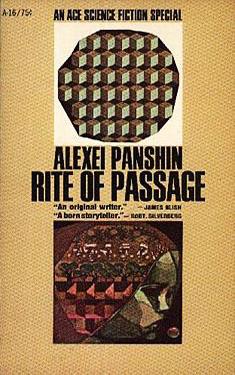Alexei Panshin
Completed 8/23/2015, Reviewed 8/25/2015
4 stars
Mia lives on a spaceship that held many of the survivors of
the self-destruction of earth. Now that
most of the survivors have colonized other planets, the relatively small
population of the ship maintains its size by limiting births and putting 14
year olds through Trial, a rite of passage where they must live on a colony
planet with limited supplies for 30 days.
Trial has a significant mortality rate.
The spoiled daughter of the Chairman of the ship’s Council, Trial forces
Mia to reevaluate her father, her peers, her instructors, and her parochial
moral values. While not specifically a
YA novel, this book feels like an ancestor of the recent crop of coming of age
through some terrible trial type YA books and movies.
 I really liked this book.
I thought Panshin did a great job of creating a spoiled tweener
girl. She knows how to manipulate her
friends and father. She parrots the
views of a very parochial environment, and doesn’t change until she is faced
with seeing the other as just as human as she.
I’d be interested in how women readers feel about Mia. Did Panshin capture the essence of a pre-teen
girl, or can you tell it’s a man trying to write as a girl? And as a man, I’m looking at it through my
own lenses, remembering how I perceived the girls in my 7th and 8th
grade class vs. the women I knew in college.
This book won the Nebula, and I wonder if it’s because it’s a good study
of a strong female character at a time in SF’s history when there still weren’t
many girls or women appearing on the pages except as wives, secretaries, or
communications officers.
I really liked this book.
I thought Panshin did a great job of creating a spoiled tweener
girl. She knows how to manipulate her
friends and father. She parrots the
views of a very parochial environment, and doesn’t change until she is faced
with seeing the other as just as human as she.
I’d be interested in how women readers feel about Mia. Did Panshin capture the essence of a pre-teen
girl, or can you tell it’s a man trying to write as a girl? And as a man, I’m looking at it through my
own lenses, remembering how I perceived the girls in my 7th and 8th
grade class vs. the women I knew in college.
This book won the Nebula, and I wonder if it’s because it’s a good study
of a strong female character at a time in SF’s history when there still weren’t
many girls or women appearing on the pages except as wives, secretaries, or
communications officers.
The book is short. I
read it in two days. The prose is
sparse, but I enjoyed that here, having recently read a lot of books where the
prose got in the way of the story. I’ve
been thinking a lot that books need better editors, lopping off at least one
hundred pages on some of these large tomes.
This book felt right: short, to the point, but still connecting me to
the characters and keeping me engaged with the plot. It explores important themes like racism, the
generation gap, and hegemonic colonization, or how countries like ours have
treated the third world. I was actually
surprised when I realized this was a morality play. And Panshin drives home his points as Mia
confirms her old beliefs through her philosophy studies and then experiences a
metanoia through the events that occur during her Trial.
I give this book four stars out of five. I loved Mia and her journey. I was completely engrossed in the plot and
loved how she grew from her experience.
There are tons of great quotes, which I wish I had written down. But there was one that I’ll paraphrase for my
closing: No one should be able to kill
someone unless they know them and will be forced to feel something for having
taken that life. It sounds simplistic
and doesn’t cover crimes committed by persons the victims know, but it makes a
great point about the insanity of war and the dehumanization of the other.
No comments:
Post a Comment